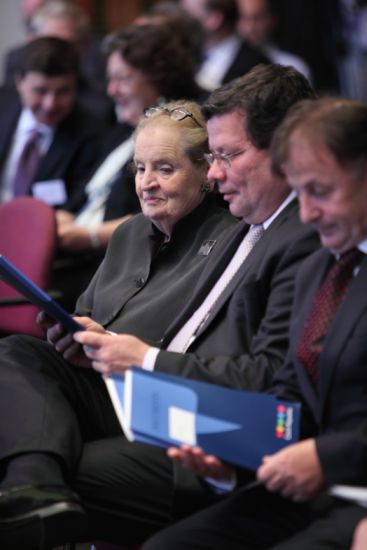The symposium was held under the auspices of the Czech Ambassador Michael Žantovský, in cooperation with the Embassies of Poland and Slovakia.
Madeleine Albright, former US Secretary of State, at present a Professor of diplomacy at the Georgetown University in Washington was the guest of honour and keynote speaker.
Alexandr Vondra, Minister of Defence of the Czech Republic also attended the symposium and delivered introductory remarks in the second panel.
The first panel The Finest Hour dealt with the military and political significance of the Battle of France and the Battle of Britain and the growing involvement of the exile political and military elements from Central Europe in the struggle. Greg Hands, MP held the introductory remarks. The panel was chaired by Dr Robin Aizlewood, Director of the School of the Slavonic and East European Studies at UCL. The panelists were as follows: Prof Richard Overy (University of Exeter), Dr Peter Neville (University of Westminster), Dr Martin Kovář (Charles University, Prague) and Jerzy B. Cynk (Polish Air Force Association in Great Britain) whose speech was delivered by Peter Devitt (Royal Air Force Museum London).
The second block, chaired by Dr Aizlewood, was entitled The Seeds of the Future and focused on the emergence of the exile governments in London as an integral part of the anti-Axis Alliance. The speakers: Prof Robert Pynsent (UCL), Dr Martin D Brown (Richmond, the American International University in London), Dr Jan Láníček (University of Southampton), Prof Anita Prazmowska (LSE) and Dr Edita Ivaničková (Slovak Academy of Sciences).
In her keynote speech Mrs Albright reminded of the first Czechoslovak President Tomáš Garrigue Masaryk and his role in the inter-war Czechoslovakia and Europe. To her he was a champion of Czechoslovak nationalism but he did not see nationalism as others did. She said: ”.. To him, the rights of people were only validated by the ethics of that people. And national pride had value not because it set one country apart from another, but because it encouraged secure and confident nations to join in projects on behalf of order, prosperity and law. ...” Being an ex-politician she stressed that the decision-makers must always make their decisions on facts and information available at the time. She said: “... we must bear in mind how much easier it is to identify the right policy when we have had seventy years to think about it. I have no doubt that in 2080 we will know exactly what we should have done in 2010 to deal with Al Qaeda, the Taliban, Iran’s nuclear programme, global warming, financial red ink, and Kim Jong-il. ..”
The third session The Uses and Abuses of History was chaired by the Czech Ambassador Michael Žantovský. It dealt with the current perspectives of the events of 70 years ago, in particular with some of the recent studies that aim to complete, supplement or revise our knowledge of the era. The panelists were as follows: Prof Jiří Pribáň (University of Cardiff), Dr Muriel Blaive (Ludwig Boltzmann Institute, Vienna), Dr Vít Smetana (Academy of Sciences, Prague) and Prof Vojtěch Mastný (Centre for Security Studies, Zurich).
There were above 150 guests attending the symposium – scholars and academics, diplomats, UK state administration officials, Czechoslovak and Polish veterans, students, experts from the British institutions and members of Czech British Chamber of Commerce.
 |
source: Embassy of The Czech Republic in London